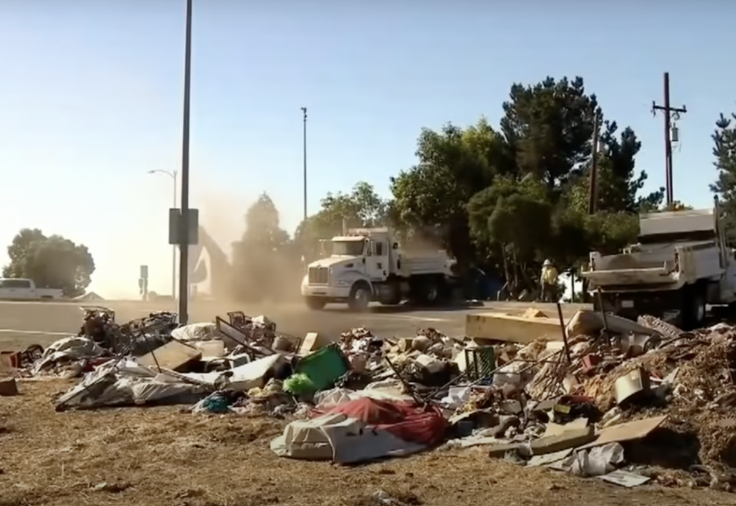Berkeley, Calif., has removed more than 75 tons of garbage, human waste, and drug paraphernalia from homeless camps since September, according to the city's latest budget proposal.
The 2023-2024 budget describes the work of Berkeley's Homeless Response Team, which it says "performed at least weekly garbage collection and debris removal from encampments across the City, removing over 151,000 pounds of trash between September 2021 and March 2022."
The scale of Berkeley's encampment cleanup efforts is indicative of the homelessness crisis facing many California cities, which worsened amid state and local government-imposed lockdowns during the pandemic. Sixty-four percent of Californians say homelessness is a "big problem" in their part of the state, and 63 percent say the number of homeless people in their community has grown.
With an estimated 535 homeless people living in tents or on the street in Berkeley, the city's cleanup efforts amount to nearly 500 pounds of garbage removed per homeless person per year. A spokesman for the city confirmed to the Washington Free Beacon that human waste and drug paraphernalia factored into the weight of the trash removed from camps.
Berkeley resident Michael Shellenberger, who this month placed third in California's nonpartisan gubernatorial primary as an independent candidate, faults progressive policies for California's homelessness crisis. He said the tons of waste Berkeley collects from camps serve as proof of the city's rashness in allowing the homeless to shelter outside.
"The data showing that Berkeley's homeless population is producing 500 pounds of garbage per person is yet more evidence that it is unsafe and unsanitary to allow homeless people to sleep outside," Shellenberger told the Free Beacon. "The evidence comes just a few weeks after the release of data showing that homeless people in Los Angeles are three times more likely to die than homeless people in New York because most of the homeless in L.A. are unsheltered. How many more must die before California governor Gavin Newsom and the Democratic mayors of California's cities act?"
Berkeley's Homeless Response Team launched in September after a year and a half in which the city did not clean up encampments because of Centers for Disease Control and Prevention guidance, a period in which the "encampment situation … got much worse," according to the city spokesman. The city established the team with the objective of reducing "the impact of encampments on the city … while avoiding citation and arrest."
The Homeless Response Team "performed 16 closures of large and dangerous encampments," according to the budget, "resolving conditions that included raw sewage and human waste, loose and scattered syringes and drug paraphernalia, rodents and other vector hazards, rotting food, and obstruction of sidewalks and vehicular lanes of traffic."
The city boasted in the report that it issued zero criminal citations and made "only one arrest" in the process of clearing dangerous encampments of hazardous waste.
Richie Greenberg, one of the leaders of this month's successful campaign to recall far-left San Francisco district attorney Chesa Boudin, criticized Berkeley for tolerating open-air encampments, saying the money spent on clearing garbage and human waste should go toward "a permanent solution for the homeless problem."
As part of its efforts to clean up the streets, Berkeley offered shelter to "well over" 200 homeless people, the budget said. Sixty-one percent of those offered housing by the city refused. When asked by the Free Beacon about the low acceptance rate, Berkeley's spokesman said the city is "striving ... to eliminate barriers to utilizing our shelters, to make them welcoming and comfortable, and to ensure that they create meaningful pathways to housing."
Berkeley is famous for its far-left policies—it was the first in the country to establish "sanctuary city" laws. Since the pandemic, however, the liberal city has bowed to increasing pressure from residents to take more aggressive action against homelessness. The city has moved to evict homeless RV-dwellers and began clearing out some larger encampments. The spokesman for Berkeley pointed to the city's roughly 5 percent decline in homelessness since 2019, telling the Free Beacon that Berkeley's efforts to fight homelessness are "paying off, even though we have so much more to do."
Shellenberger was less confident that Democrats are committed to removing dangerous homeless camps from California's cities.
"How much more garbage must accumulate before we require people to sleep indoors?" Shellenberger said. "Newsom and Democratic mayors appear intent to use the homeless population to destroy California's once-beautiful cities because they are in the grip of an anti-civilization ideology."
